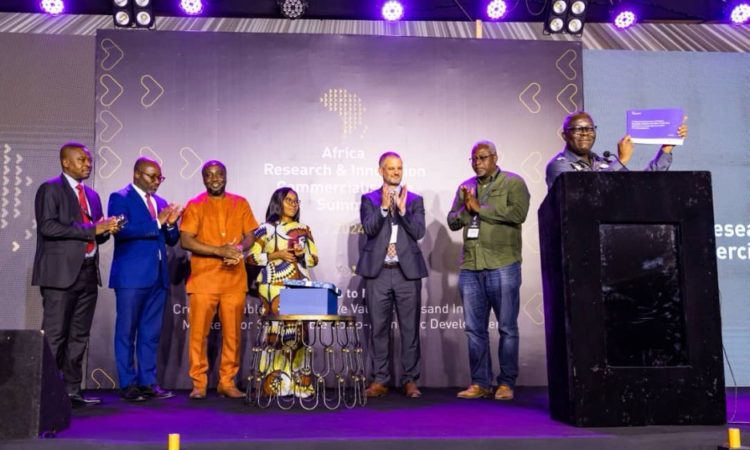Report on the formation of a Trust Corridor (TC) for innovation exchange and trade across Africa launched

A new report to guide the formation and implementation of the proposed UK-Africa Innovation Trust Corridor (ITC) to facilitate the transparent, secure, and demonstrable exchange of research and innovation outputs between the United Kingdom and its African Commonwealth nations has been launched in Accra.
The report, titled “Research-based evidence to support the formation of the proposed UK-Ghana Innovation Trust Corridor (ITC),” was unveiled at the maiden Africa Research and Innovation Commercialization Summit (ARICS 2024), held at the Labadi Beach Hotel.
The UK-Africa Innovation Trust Corridor establishes the infrastructure and protocols for innovation co-creation, innovation trade, protecting intellectual property rights, knowledge transfer, and shared operational standards.
It will also foster a robust regime for research and innovation commercialisation within and across nations in the commonwealth, with the United Kingdom being the initial anchor region.
In terms of benefits, the ITC enhances research quality and quantity, fosters entrepreneurship and revenue generation, improves social and environmental outcomes, enables trust-building for crucial and successful collaboration for access to new markets and strengthened bilateral relations.
The research-based evidence report identified gaps in skills and funding, bureaucracy, stakeholder misconceptions and infrastructure constraints as key challenges facing the innovation ecosystem across the African Commonwealth region.
It further established that opportunities exist for quality human resources and market education and that the region must prioritise innovation as the catalyst for long-term success. In addition, the report admonished that Africa must explore more partnerships for knowledge sharing and the adoption of market-centric approaches to meet consumer needs.
Launching the report, the Senior Advisor to the Vice President, Prof. Kwaku Appiah-Adu, underscored the potency of evidence-based research in governance, academia, and industry.
He noted: “Focusing on Africa, the research and innovation trust corridor will be a great platform for businesses, especially small and medium-sized enterprises, as we build on boosting intra-African trade, which is a major pillar of the AfCFTA.
We hope that the findings of the work will go a long way to help build the Africa we want.”
Chief Executive Officer of Heritors Labs Limited and co-author of the report, Mr. Derrydean Dadzie, in his brief remarks at the report launch said: “It’s very important to have a trusted platform for innovation engagement. This report establishes the viability of setting up a trusted corridor that pools innovators from different countries to promote innovation co-creation, trade, and knowledge sharing.”
He elaborated that the proposed Innovation Trust Corridor will outline and supervise key measures that will alleviate pressing challenges and barriers stifling the advancement of research and innovation commercialisation in the African Commonwealth region.
For his part, the Director of Development at the British High Commission, Mr Richard Sandall, disclosed that the ITC report was commissioned as evidence-based research for the sustainable development goals to better understand the practical aspect of innovation commercialisation and identify the challenges and opportunities.
He said: “The Innovation Trust Corridor is an important concept of the UK government and Ghana to further deliver on an existing science and technology strategy between the two countries.
It will serve as the platform for innovators, researchers, and investors across the two countries to collaborate more easily.”
Funded by the Foreign Commonwealth and Development Office (FCDO), the UK-Africa Innovation Trust Corridor will foster public-private partnerships to strengthen research and innovation commercialisation, provide deregulation and policy support to streamline processes for efficient commercialisation, and encourage collaborations between industry, academia, and the research community.
The report was co-authored by Dr Maame Yaakwaah Blay Adjei, Prof. Louis Asiedu and Dr. George Acheampong.
Another report launched concurrently with the ITC was the Trajectorial Discovery of Ghana’s Innovation and Value Chain Map (IMVCM), which explored and mapped Ghana’s innovation market and value chain.
The IMVCM, co-authored by Mr Derrydean Dadzie and Dr Gordon Adomdza, is a tool that helps ecosystem actors understand and improve the innovation landscape and market in Ghana. It outlines the journey from research intent to market through utilisation to disposal.
The report recommended effective coordination among supporting entities to ensure the relevance and sustainability of research and innovation activities in Ghana. It also suggested that transforming research into marketable products would require addressing funding and resource constraints.
The Africa Research and Innovation Commercialisation Summit was sponsored by the Research and Innovation Systems for Africa (RISA)) Fund and the Foreign Commonwealth and Development Office (FCDO) of the United Kingdom.







